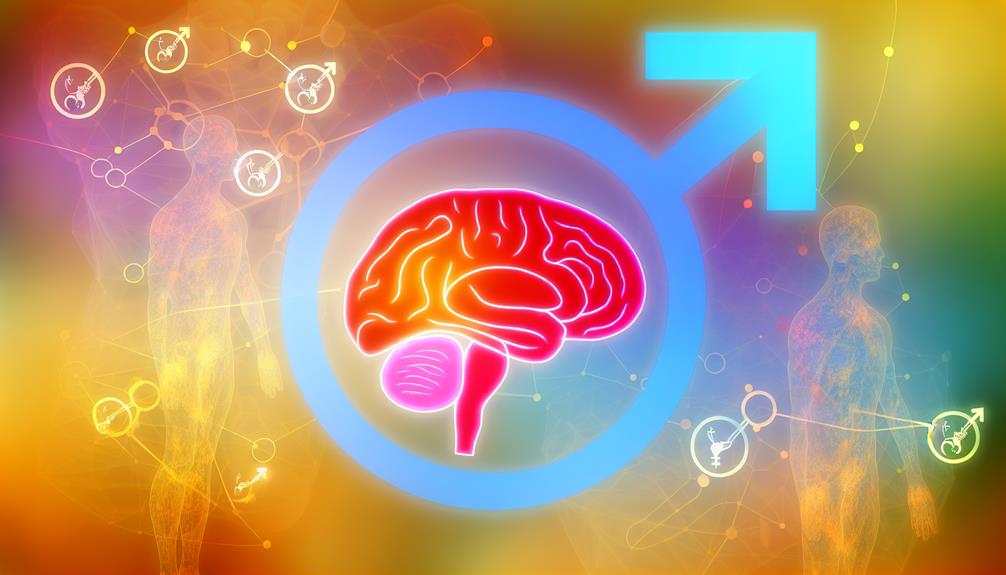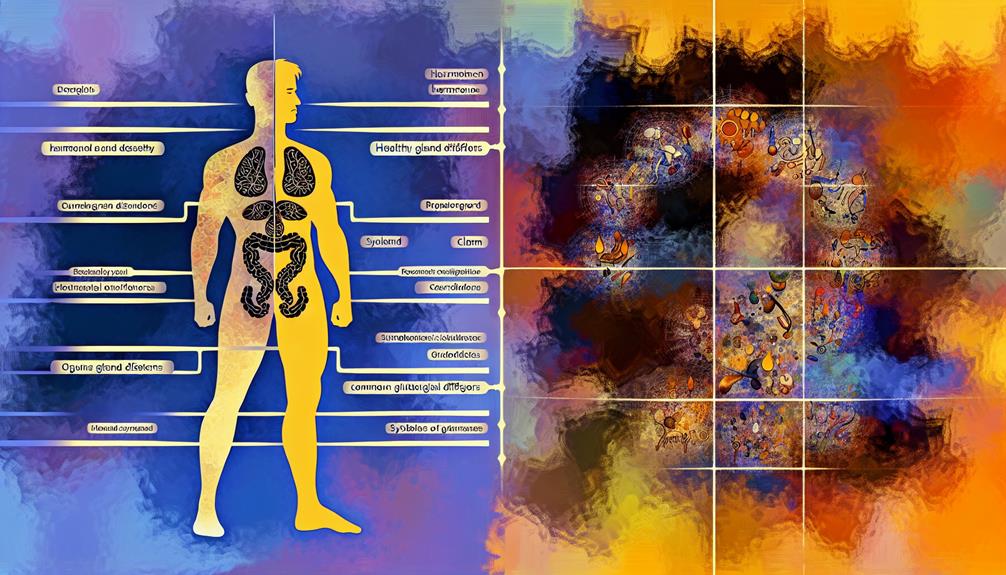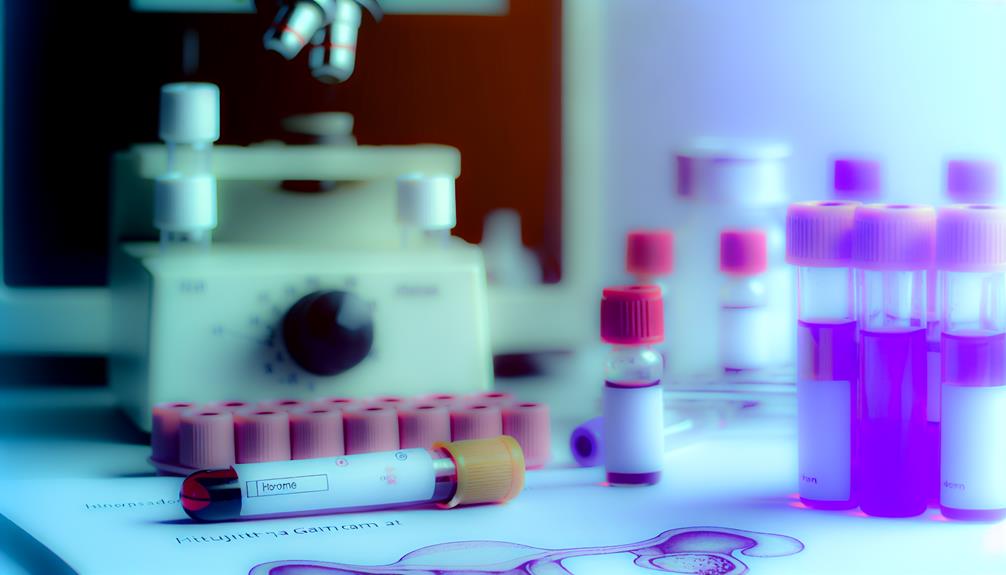When the pituitary gland malfunctions, it significantly disrupts hormone balance in men. This gland regulates important hormones like Luteinizing Hormone (LH) and Follicle-Stimulating Hormone (FSH), which are essential for testosterone production and reproductive health. Conditions such as hyperpituitarism or hypopituitarism can lead to either excess or insufficient hormone levels, respectively. As a result, symptoms can range from decreased libido and erectile dysfunction to emotional disturbances like anxiety and irritability. Understanding these hormonal impacts is vital for managing health. If you're intrigued by the connections and how they can be addressed, there's more to uncover.
Understanding the Pituitary Gland

The pituitary gland, often referred to as the "master gland," plays a fundamental role in regulating various hormonal functions within the body, including male hormone balance. Nestled beneath the brain, this pea-sized structure is divided into the anterior and posterior lobes, each responsible for releasing different hormones. The anterior lobe secretes essential hormones such as luteinizing hormone (LH) and follicle-stimulating hormone (FSH), which are necessary for testosterone production and overall male reproductive health.
Understanding the anatomy of the pituitary gland is important. It's connected to the hypothalamus by the pituitary stalk, facilitating hormonal feedback loops that maintain homeostasis. The hypothalamus releases gonadotropin-releasing hormone (GnRH), stimulating the anterior pituitary to produce LH and FSH. This hormonal feedback mechanism guarantees that testosterone levels are finely tuned; when testosterone levels rise, feedback to the hypothalamus decreases GnRH output, thus reducing LH and FSH production.
Disruptions in this feedback system can lead to hormonal imbalances, impacting male health considerably. For instance, if the pituitary gland malfunctions and fails to produce adequate LH and FSH, testosterone synthesis in the testes can be severely compromised, potentially resulting in conditions such as hypogonadism. As a result, understanding the intricate connections between pituitary anatomy and hormonal feedback is essential for comprehending how this small yet powerful gland influences male hormone balance and overall well-being.
Role of Hormones in Males
Hormones play an essential role in male physiology, influencing a wide array of functions from reproductive health to mood regulation. The primary hormones involved include testosterone, luteinizing hormone (LH), and follicle-stimulating hormone (FSH). Testosterone, the principal male sex hormone, is vital for spermatogenesis, libido, and muscle mass maintenance. Its production is intricately regulated by the endocrine system, specifically through hormonal feedback mechanisms that involve the hypothalamus and the pituitary gland.
The hypothalamus releases gonadotropin-releasing hormone (GnRH), stimulating the anterior pituitary to secrete LH and FSH. LH promotes testosterone production in the Leydig cells of the testes, while FSH is essential for spermatogenesis. This hormonal feedback loop guarantees that testosterone levels remain within a physiological range, responding to the body's needs. For instance, if testosterone levels drop, the hypothalamus increases GnRH secretion, thereby enhancing LH and FSH production to restore balance.
Disruptions in endocrine regulation can lead to significant health issues. Elevated estrogen levels or low testosterone can result from various factors, including obesity or stress, affecting mental health and physical well-being. In addition, imbalances in LH and FSH can impair fertility. Thus, understanding the role of these hormones and their interdependent regulatory mechanisms is vital for maintaining male health. I hope this sheds light on the complex interplay of hormones that underpins male physiology, emphasizing the importance of hormonal balance for overall health.
Common Pituitary Disorders

In exploring common pituitary disorders, I find it essential to understand how hyperpituitarism can lead to excessive hormone production, impacting male health considerably. Conversely, hypopituitarism's consequences can result in insufficient hormone levels, which also disrupts physiological balance. Additionally, the presence of tumors in the pituitary gland can alter hormone secretion patterns, further complicating the hormonal landscape in men.
Hyperpituitarism Effects
Many individuals may not realize that hyperpituitarism, a condition characterized by the excessive secretion of one or more pituitary hormones, can profoundly disrupt male hormone balance. This dysfunction often stems from adenomas—benign tumors that lead to overproduction of hormones like prolactin, growth hormone, or adrenocorticotropic hormone (ACTH). Such imbalances can manifest as altered testosterone levels, resulting in symptoms including reduced libido, erectile dysfunction, and even gynecomastia.
Diagnosing hyperpituitarism involves a thorough approach, including hormonal assays and imaging studies like MRI to identify the presence of tumors. The treatment approaches typically include surgical intervention to remove the adenoma, alongside medical therapies such as dopamine agonists for prolactin-secreting tumors or somatostatin analogs for growth hormone excess. Radiation therapy may also be considered in resistant cases.
Understanding the causes of hyperpituitarism and how they affect male hormone levels is essential for effective management. By addressing these imbalances, we can restore hormone equilibrium and mitigate the adverse effects on male health. It's important for those experiencing symptoms to seek medical evaluation and consider the available treatment options.
Hypopituitarism Consequences
Hypopituitarism represents a significant clinical challenge, as it involves the underproduction of one or more hormones from the pituitary gland, leading to a cascade of physiological disruptions. This condition can stem from various causes, including pituitary tumors, traumatic brain injury, or autoimmune diseases. The resultant hormonal deficiencies, particularly in testosterone, can dramatically affect male health, leading to symptoms such as decreased libido, fatigue, and loss of muscle mass.
The treatment challenges associated with hypopituitarism are multifaceted. Hormone replacement therapy is often necessary to restore balance; however, finding the appropriate dosages can be complicated. For instance, in cases of testosterone deficiency, monitoring serum testosterone levels and adjusting treatment accordingly is critical to avoid under-treatment or over-treatment, both of which have significant implications for health outcomes.
Furthermore, addressing multiple hormonal deficiencies may require a coordinated approach involving endocrinologists and primary care providers. This complexity underlines the importance of a thorough diagnostic evaluation to identify the specific hormonal deficits and tailor treatment plans effectively. Ultimately, managing hypopituitarism demands not only an understanding of the underlying causes but also a commitment to steering through its treatment challenges.
Tumors and Hormones
Pituitary tumors can greatly disrupt hormone production, leading to a range of disorders that affect overall health. These tumors, categorized into various types such as adenomas and carcinomas, can result in either hypersecretion or hyposecretion of hormones. For instance, prolactinomas often cause excessive prolactin, impacting testosterone levels and leading to symptoms like infertility and libido loss.
Diagnosing these disorders presents considerable challenges; imaging techniques like MRI are essential but can sometimes yield ambiguous results. This complexity necessitates a thorough understanding of hormonal feedback mechanisms, as hormonal imbalances can further exacerbate the tumor's effects.
Treatment strategies vary based on tumor type and size, often involving surgery, radiation therapy, or pharmacotherapy to manage hormone secretion. Symptom management is equally important, as patients frequently report emotional and physical distress due to hormonal fluctuations.
Research advancements in the field are promising, particularly in understanding tumor biology and developing targeted therapies. As we navigate the complexities of pituitary tumors, it's crucial to take into account patient experiences and tailor treatment approaches to address individual needs effectively. This holistic perspective can greatly enhance outcomes for those affected by these disorders.
Symptoms of Hormonal Imbalance
Experiencing hormonal imbalance can manifest in various physical and psychological symptoms that greatly impact one's quality of life. One of the most prevalent indicators I've noticed is mood swings, which can range from irritability to severe emotional instability. These fluctuations often coincide with heightened anxiety symptoms, making daily interactions challenging. Additionally, sexual dysfunction has become a significant concern; many men report a decreased libido and difficulty achieving or maintaining erections, which can lead to further emotional distress.
Fatigue levels also play a vital role in this imbalance. I often feel a persistent exhaustion that doesn't correlate with my activity levels, leading to weight changes that are both frustrating and troubling. Sleep disturbances, such as insomnia or restless nights, exacerbate this fatigue, creating a vicious cycle that's hard to escape.
Moreover, I've observed muscle weakness, which seems disproportionate to my physical exertion and contributes to my overall sense of helplessness. For some, these hormonal issues can lead to infertility problems, adding stress to relationships and personal aspirations.
Testosterone and Its Importance

Testosterone plays a critical role in muscle growth, promoting protein synthesis and enhancing strength. Its influence extends beyond physical attributes, as it greatly affects mood regulation, impacting overall mental health and well-being. Understanding these functions is essential for grasping the broader implications of testosterone levels in the context of pituitary gland dysfunction.
Role in Muscle Growth
When it comes to muscle growth, the role of testosterone is undeniably significant. This hormone is essential for muscle hypertrophy, which refers to the increase in muscle size that results from resistance training. Testosterone promotes protein synthesis, enhancing the body's ability to repair and grow muscle fibers after exercise. Research has shown that individuals with higher testosterone levels often experience greater muscle gains, particularly in response to strength training.
Interestingly, some athletes turn to anabolic steroids, synthetic derivatives of testosterone, to amplify these effects. While these substances can lead to rapid muscle mass increases, they also pose serious health risks, including hormonal imbalances and cardiovascular issues. The pituitary gland's malfunction can disrupt testosterone production, resulting in diminished muscle growth and potential atrophy.
In my experience, maintaining ideal testosterone levels through natural means—such as nutrition, exercise, and sleep—is essential for achieving sustained muscle hypertrophy. Understanding the role of testosterone in muscle growth reinforces the importance of hormonal balance and the potential consequences of its dysregulation, particularly for those seeking to maximize their physical performance.
Influence on Mood Regulation
Hormonal balance extends beyond just physical performance; it considerably affects mood regulation as well. As I've studied the connections between testosterone levels and emotional health, it's clear that fluctuations in this hormone can lead to significant emotional disturbances. Low testosterone, often a consequence of pituitary gland malfunction, is linked to increased emotional fluctuations, anxiety, and depression.
Research indicates that testosterone plays a crucial role in modulating stress responses. When I look at studies, it's evident that adequate testosterone levels can enhance resilience to stress, thereby stabilizing mood. In men experiencing hormonal imbalances, the body's ability to cope with stress diminishes, leading to heightened feelings of irritability and sadness.
Moreover, testosterone influences neurotransmitter systems that govern mood, including serotonin and dopamine pathways. When testosterone is deficient, the resulting imbalance can exacerbate symptoms of depression and anxiety.
Consequently, understanding the significance of testosterone in mood regulation is essential. It's not merely about physical vigor; it's also about emotional well-being. Addressing pituitary dysfunction can therefore be a pivotal step toward restoring not just hormonal balance but also emotional stability in affected individuals.
Effects on Reproductive Health
A significant imbalance in male hormones often stems from pituitary gland malfunction, which can profoundly affect reproductive health. The pituitary gland plays a vital role in regulating hormones that directly influence the endocrine system, including testosterone and luteinizing hormone (LH). When this gland malfunctions, it leads to decreased stimulation of reproductive organs, causing reduced sperm production. This reduction in sperm count can manifest as fertility issues, making conception challenging for couples.
Evidence suggests that men experiencing hormonal imbalances may also encounter erectile dysfunction. This condition arises when insufficient testosterone levels disrupt the physiological processes necessary for achieving and maintaining an erection. Additionally, the intricate relationship between hormones and sexual health cannot be overstated; any disruption can lead to diminished libido and overall sexual performance.
Hormone therapy can be a viable treatment option for addressing these imbalances. By restoring appropriate hormone levels, it can enhance sperm production and alleviate erectile dysfunction. However, it's essential to approach hormone therapy with caution, as improper management may exacerbate existing issues within the endocrine system.
Impact on Mood and Mental Health

Imbalances in male hormones can greatly disrupt mood and mental health, leading to a range of psychological symptoms. These hormonal fluctuations often result from pituitary gland malfunction, which can markedly affect areas such as emotional resilience and cognitive function. When I reflect on the impact, I can't help but note several key effects:
- Increased Anxiety: Hormonal disturbances can heighten the body's stress response, making anxiety management a challenging endeavor. Elevated cortisol levels often accompany low testosterone, exacerbating feelings of unease.
- Mood Swings: Erratic hormone levels can lead to severe mood stabilization issues, resulting in unpredictable emotional states that can be distressing for both the individual and those around them.
- Cognitive Decline: Research indicates that hormonal imbalances may impair cognitive function, affecting memory, focus, and decision-making. This cognitive decline can further intensify feelings of frustration and helplessness.
- Depression: Low levels of testosterone have been linked to depressive symptoms, illustrating how essential hormone balance is for overall mental wellness. The interplay between mood and hormonal regulation cannot be overstated.
Diagnosis of Pituitary Malfunction
When evaluating potential pituitary malfunction, it's vital to recognize the symptoms that may indicate hormonal imbalances, such as fatigue, mood swings, or changes in libido. I'll also explain the various diagnostic testing methods available, including blood tests for hormone levels and imaging techniques like MRI to evaluate gland structure. Understanding these aspects is essential for accurate diagnosis and effective treatment planning.
Symptoms of Pituitary Dysfunction
Recognizing symptoms of pituitary dysfunction can be significant for timely diagnosis and treatment. As I explored the complexities of hormonal balance, I realized that symptom identification plays an essential role in understanding the implications of pituitary gland issues. The following are common symptoms that warrant a thorough hormonal assessment:
- Fatigue: Persistent tiredness that doesn't improve with rest may indicate hormonal imbalances.
- Decreased Libido: A significant drop in sexual desire can signal low testosterone levels, often linked to pituitary dysfunction.
- Mood Changes: Unexplained fluctuations in mood or increased irritability can stem from hormonal disruptions driven by pituitary issues.
- Changes in Body Composition: Unintended weight gain or loss, particularly muscle mass, can reflect underlying hormonal disturbances.
These symptoms aren't merely signs; they are red flags that suggest dysfunction within the delicate endocrine system. By recognizing these indicators early, we can facilitate prompt evaluations and interventions, preventing further complications. Understanding the intricate relationship between the pituitary gland and male hormone balance empowers us to take proactive steps toward restoring health.
Diagnostic Testing Methods
Diagnostic testing for pituitary malfunction typically involves a multi-faceted approach, utilizing both blood tests and imaging techniques to evaluate hormonal levels and structural abnormalities. Initially, a detailed clinical assessment is conducted, focusing on symptoms that may indicate hormonal imbalance. Blood tests are essential for establishing hormone profiles, measuring levels of pituitary hormones like ACTH, GH, and TSH, as well as downstream targets such as cortisol and testosterone.
Imaging studies, particularly MRI and CT scans, provide radiological imaging of the pituitary gland, helping to identify tumors or structural anomalies. Stimulation tests may also be employed to assess the gland's functional capacity, determining how it responds to specific stimuli. In some cases, urine analysis can complement blood tests to gauge hormone excretion patterns.
For a thorough endocrine evaluation, genetic screening may be indicated to rule out hereditary conditions. If necessary, a pituitary biopsy may be performed to obtain tissue samples for histological examination, further clarifying the diagnosis. Each of these diagnostic modalities plays a fundamental role in formulating an accurate diagnosis and guiding effective treatment for pituitary dysfunction.
Hormonal Testing Procedures

Hormonal testing procedures are vital for accurately evaluating the function of the pituitary gland and its impact on male hormone balance. When I engage in an endocrine evaluation, I focus on various hormonal assays to identify any underlying dysfunction. These assays are crucial for determining the levels of key hormones, which can reveal the intricate interplay between the pituitary gland and male reproductive health.
Here's what I typically consider during the testing process:
- Blood Sample Collection: I'll start by collecting blood samples, often in the morning when hormone levels peak, to guarantee accurate results.
- Hormonal Assays: I'll analyze the blood for testosterone, luteinizing hormone (LH), and follicle-stimulating hormone (FSH). Each of these hormones plays a significant role in regulating male reproductive functions.
- Dynamic Testing: Sometimes, I might employ dynamic testing, such as the GnRH stimulation test, to evaluate the pituitary's response to stimulation and assess its functional status more thoroughly.
- Result Interpretation: Finally, interpreting the results requires understanding the reference ranges and considering potential confounding factors like age, lifestyle, and comorbidities.
Treatment Options Available
After completing the hormonal testing procedures, it's important to explore the various treatment options available for addressing pituitary gland malfunction and restoring male hormone balance. The approach to treatment typically hinges on the underlying cause of the dysfunction.
In many cases, medication options can effectively manage hormonal imbalances. For instance, if the pituitary malfunction leads to deficiencies in testosterone or other key hormones, hormone replacement therapy (HRT) might be prescribed. This can include testosterone injections, topical gels, or pellets, allowing for a more tailored approach to restoring hormone levels. Additionally, if the dysfunction is due to hyperprolactinemia, medications such as cabergoline or bromocriptine can reduce prolactin levels, thereby normalizing testosterone production.
However, there are situations where medication isn't sufficient. Surgical interventions may be necessary, particularly in cases of pituitary tumors, which can disrupt hormone production. Transsphenoidal surgery is a common procedure employed to remove these tumors while minimizing damage to surrounding pituitary tissue. This can lead to significant improvement in hormone levels and overall endocrine function.
Ultimately, the choice between medication and surgery will depend on the specific diagnosis, the severity of the dysfunction, and individual patient circumstances. Consulting with an endocrinologist is vital in determining the most appropriate treatment plan. By considering both medication options and surgical interventions, we can effectively address the complications stemming from pituitary gland malfunction and work towards restoring a healthy hormonal balance.
Lifestyle Changes for Balance

Making lifestyle changes can profoundly impact the balance of male hormones, especially when dealing with pituitary gland dysfunction. I've found that implementing specific strategies not only improves hormone levels but also enhances overall well-being. Here are four key areas to focus on:
- Dietary Adjustments: I've learned that a balanced diet rich in omega-3 fatty acids, antioxidants, and lean proteins can support hormonal health. Incorporating foods like fish, nuts, and leafy greens has made a noticeable difference in my energy levels.
- Exercise Routines: Regular physical activity is essential. I've adopted a mix of strength training and cardiovascular exercises, which not only help in regulating testosterone but also improve mood and reduce anxiety. Aim for at least 150 minutes of moderate activity weekly.
- Stress Management: Chronic stress can wreak havoc on hormone levels. I've started practicing mindfulness techniques, such as meditation and deep breathing exercises, which have been effective in reducing stress and promoting hormonal balance.
- Sleep Hygiene: Quality sleep is non-negotiable. I've prioritized creating a soothing bedtime routine, limiting screen time, and maintaining a consistent sleep schedule. This has considerably improved my sleep quality and hormone production.
In addition to these strategies, I also consider supplement options and hydration strategies while leaning on social support from friends and family. These lifestyle changes have empowered me to take control of my hormonal health and foster a more balanced life.
Long-term Health Implications
While addressing pituitary gland dysfunction through lifestyle changes can yield immediate benefits, it's essential to understand the long-term health implications associated with male hormone imbalance. Over time, persistent hormonal irregularities can lead to significant long-term effects that extend beyond mere symptoms. For instance, a consistent deficiency in testosterone can contribute to a cascade of chronic conditions, including cardiovascular disease, osteoporosis, and metabolic syndrome.
Research indicates that men suffering from low testosterone levels are at a higher risk of developing these complications, which can severely impair quality of life. The relationship between testosterone deficiency and cardiovascular health is particularly concerning; studies have shown that low levels correlate with increased blood pressure and higher rates of heart attacks. Additionally, testosterone plays a vital role in maintaining bone density. Prolonged imbalances may precipitate osteoporosis, making fractures more likely as one ages.
Moreover, the psychological effects of long-term hormone imbalance can't be overlooked. Chronic fatigue, depression, and decreased cognitive function frequently accompany low testosterone levels. This creates a vicious cycle where the psychological burden exacerbates the hormonal imbalance, leading to further deterioration.
In understanding these long-term health implications, it becomes clear that managing pituitary gland dysfunction isn't just about immediate relief. It's about preventing the onset of serious chronic conditions that can affect overall health and longevity. Therefore, a proactive approach is essential for sustaining well-being in the years to come.
Seeking Professional Help

Steering through the complexities of pituitary gland malfunction and its impact on male hormone balance often necessitates professional intervention. When I realized the intricacies of this condition, I understood that seeking help from healthcare professionals was imperative. The interplay between hormonal levels and overall health can be intricate, and I found it essential to address this with expert guidance.
Here are four important steps to take into account when seeking professional help:
- Consult an Endocrinologist: These specialists have the expertise to evaluate hormonal imbalances and recommend appropriate diagnostic tests, like MRI or blood panels.
- Engage in Psychological Support: Understanding the emotional toll that hormonal imbalances can take on mental health is significant. Therapy options, such as cognitive behavioral therapy, can help manage anxiety and depression linked to these health issues.
- Explore Medication Options: Depending on the diagnosis, medications such as hormone replacement therapy or dopamine agonists may be prescribed to restore balance effectively.
- Take into Account Lifestyle Modifications: A healthcare professional can guide you on lifestyle changes, including diet and exercise, which can positively impact hormone levels.
Frequently Asked Questions
Can Diet Influence Pituitary Gland Function in Men?
I've always believed that our bodies are like finely tuned instruments, where diet plays a symphony in nutrient absorption and hormonal balance. Evidence suggests that what we eat can indeed influence pituitary gland function in men. Nutrient-rich foods, such as omega-3 fatty acids and antioxidants, can promote ideal hormone production. A well-balanced diet not only supports overall health but may also enhance the pituitary gland's ability to regulate hormones effectively.
Are There Genetic Factors Affecting Pituitary Health?
I've often pondered the role of genetic factors in pituitary health. Research shows that genetic mutations can greatly impact pituitary function, leading to various disorders. Certain hereditary conditions, like multiple endocrine neoplasia, exemplify how genetics can influence the pituitary gland's operation. These mutations can disrupt hormone production and regulation, underscoring the complex interplay between our genes and endocrine health. Understanding this connection is essential for developing targeted treatments and management strategies.
How Does Stress Impact Pituitary Hormone Production?
Imagine stress turning your pituitary gland into a hormonal volcano! Stress response can drastically alter hormone regulation, leading to an imbalance in critical hormones like cortisol and adrenaline. When we're stressed, our body signals the pituitary to release more adrenocorticotropic hormone (ACTH), which in turn can affect other hormones. This cascade can disrupt normal hormone production and regulation, ultimately impacting overall health. I've seen firsthand how chronic stress wreaks havoc on hormonal balance.
What Lifestyle Habits Exacerbate Pituitary Gland Issues?
I've found that certain lifestyle habits can greatly exacerbate pituitary gland issues. Poor exercise habits, like a sedentary lifestyle, can lead to hormonal imbalances. Additionally, inadequate sleep quality disrupts the secretion of key hormones, negatively affecting the pituitary's functionality. Research shows that consistent, moderate exercise and prioritizing restorative sleep can help maintain ideal hormone levels, suggesting that making these changes could potentially mitigate the risks associated with pituitary dysfunction.
Can Pituitary Dysfunction Lead to Infertility in Men?
Absolutely, pituitary dysfunction can lead to infertility in men. The pituitary gland regulates hormone balance, which is essential for reproductive health. When it malfunctions, it can disrupt the production of key hormones like testosterone and luteinizing hormone, causing a hormone imbalance. This imbalance can result in reduced sperm production and overall fertility issues. Research indicates that addressing pituitary disorders is important for restoring hormonal levels and improving reproductive outcomes in affected individuals.
